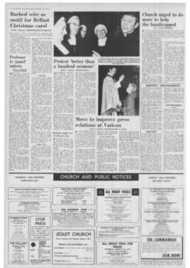Page 3, 24th December 1971
Page 3

Report an error
Noticed an error on this page?If you've noticed an error in this article please click here to report it.
Tags
Share
Related articles
The Christmas Kindling Of The Light Of Christ
Pastor Iuventus
Christmas Is A Reason For Hope In These Bleak Times
Cutting Through The Tinsel
Christmas Crib
THE TELLING VOICES by H. R. F. KEATING
The spirit of Christmas Crass
I THINK it is not too much -1to say that Christmas in this country is no longer the triumph of the Testament of Love but the triumph of the mass media. And the triumph of the mass media, let me add, at their most directly and blatantly commercial.
The tone is not set by the occasional kow-tow in the direction of the Spirit of Christmas Crass made by the editorial eolumns of the papers and the drama slots of television. What sets it is the deluge of exhortations to buy and buy that come in advertisements — in the papers, on the small screen, particularly in the glossy magazines and, in o s t characteristically, in the spate of Christmas catalogues.
And, of course, the tone is sharpest in that most ubiquitous of the mass media, the shop window. There is scarcely an establishment of any sort today that does not tell passersby in a voice hectoring or appropriately cooing that it is their duty to purchase things Christmassy. Even in our neighbourhood porn shop there is a scrawled placard saying "Ideal Xmas Present" placed above some object that I did not care to look at long enough to be able to describe.
Victorian
And very little of all the hectoring has got anything to do with the Christian feast. But, you may say, we really should not pretend in Britain today that Christmas is a Christian occasion, rather it has reverted to the old Winter Festival, Yule or the southern celebration of Sol Invictus. Yet, even if this is so, still much of the commercial business of the season is nothing less than a crude battening on the general goodwill.
Each year it gets a degree worse. If in 1957 we "never had
it so good," at Christmas now we certainly have it even better (which is to say, from the point of view of the exploited, even worse). Think what Christmas really was in the good old Victorian days, which the cornmercial propaganda tells us we should strive to emulate. Then, as anyone who has read even the first few pages of Dickens's "A Christmas Carol" will know, Christmas was one day off and no more.
The great sales boom of December may be good for business. It may keep some people employed at a time when the national unemployment figures stay unpleasantly high. But there ought to be other ways of feeding and clothing the economically atrisk than by manufacturing objects deliberately designed to be of the minimum possible benefit to their eventual recipients.
Nightshirt
Do you want a "Skating Bartender," a heart-shaped clockwork device for transporting a drink along a bar, guaranteed not to fall off the edge? Does anyone want one? Have you always, unknown to yourself, secretly needed a messages pad that costs £2 no less? And won't you rejoice on Christmas morning when you find you have been given, at a cost to somebody of £4.55, an elephant pyjama case "to brighten up the bedroom"?
Never mind, that pachyderm is not the worst on the Christmas market. There is Nellie Elephant, specially designed for the kiddies with a coat of top quality man-made plush "surface spongeable, and just asking to be stroked," to quote the catalogue, at just £75.
But this is not my particular prizewinner in the Stupidly Expensive Stakes. Beating for that prize even a stylish male nightshirt in aubergine at a nice £4.50 and a Men's Hair Drier ("styles, dries and grooms hair the professional way") at £7.95, complete with blow wave attachments. comes the Musical Telephone Rest.
You pay £5.25 for this attractive device as a gift for someone, and then when they have to leave their phone in the middle of a call they can put the receiver down on it and it will play for the caller a popular classic melody. And up to now mankind has managed without it.
There is often subtlety too about the wiles used on us. Our better instincts are ruthlessly played upon. Not only are we encouraged, for instance, to bring happiness to a child (as if a breakable object was likely to do that) but at times we are flattered into thinking we are improving a growing mind.
Take as an example a prettylooking green-coloured balance with attractive little blue weights (costing only £2.98). It is designed, we are told, "to help children discover simple addition through equilibrium." Marvellous. It's expensive but instructive. Except that a ruler laid on a finger and a few building blocks would be just as good a tool for learning.
Elephant
But the items I have mentioned have not been, if you will believe me, in the real luxury class (except for Nellie Elephant and you can get smaller animals every bit as surface spongeable in that range by paying as little as £1.75 for a parakeet). No, if you wanted really to show your feelings for someone this Christmas you ought to have aimed rather higher.
So why didn't you get a diamond brooch and matching ear-rings for £7,000? 1 wouldn't call them beautiful, since the stones are necessarily a bit clumsy for the leaves they are meant to represent, but they are nice and glittering all right. Or, for him, why wasn't it a fox fur at £395? But you would rather make it just a token? Then there is a set of bathroom smellies (Body Soft, Cologne spray, bath powder, bath oil, bubble bath, soap and face towels) for just £17.85. Or even, brutal simplicity, two giant tablets of soap "for the man ot today" costing only £3.35. But do not think that the creation of ridiculous and unnecessary objects to be given as presents at Christmas-time is a service extended only to the rich. It is applied just as vigorously at the lower end of the income scale. Take stocking fillers, for instance. You know, the handful of little objects needed finally to push home the Christmas point. Popular Boots the Chemists advertise a fine range of these at round about 50p for each one.
Ingenuity
And at this end of the range marvellous ingenuity is used too, to make small and necessary objects. which most of us could actually use were we given them, one stage more expensive by adding unnecessary trimming. Like writing-paper. Quite a happy way to express your feelings of goodwill to somebody would be to give them this small item which they could certainly put to use. So the commercial exploiters tie up the envelopes in bits of cheap ribbon, print itsybitsy flowers on the paper and ram up the cost. Thus the simple and good business of letter writing is unnecessarily complicated, at a nice profit to someone.
And if the stationery fails to complicate letter writing enough and zoom the cost up, then that most wonderful modern invention, the ballpoint pen, an extraordinarily cheap and efficient writing in strument, is seized on. Here we are, gold-coloured, in a gift box, and costing 45p. And how much better than one costing 5p?
We are all of us being exploited. And it is not quite enough for us to make resolutions to buy only sensible presents. The whole atmosphere which has been built up in favour of present-giving is too strong for almost all of us.
We are pressured into feeling we must give something to everybody at all near us, and so when that pressure roaches the point of us setting out for the shops, we have to buy. And often we buy something pretty stupid because that is what is there.
Goodness
So I am not very sanguine about it being ever possible to break the spiral we swirl up year by year. The combined forces deployed against us are too great. As we read the stolid news columns of our papers the enemy nips in at us from the flanks. We discount as nonsense the appeals 4.0 buy certain objects during the commercial breaks on television, and yet we are left with the sandy residue of a notion that we must "do something about Christmas."
There is a tremendous confidence and air of rightness about the coloured pages of magazine advertisements. They leave us feeling that giving at Christmas is in the great current of human goodness, however much we may scorn their particular advice. So soon we are actually seeking out advertisements, totally stuck for something with which to show Uncle George we have not forgotten him.
A letter would do it. "Dear Uncle George, We can't think of anything we know you would want, but we would just like to say . ." But instead we search the advertisements, and, come Christmas Day, Uncle George contemplates with inward horror and outward geniality what the catalogue called "the latest status symbol," a nest of games costing a cool £185.
blog comments powered by Disqus









